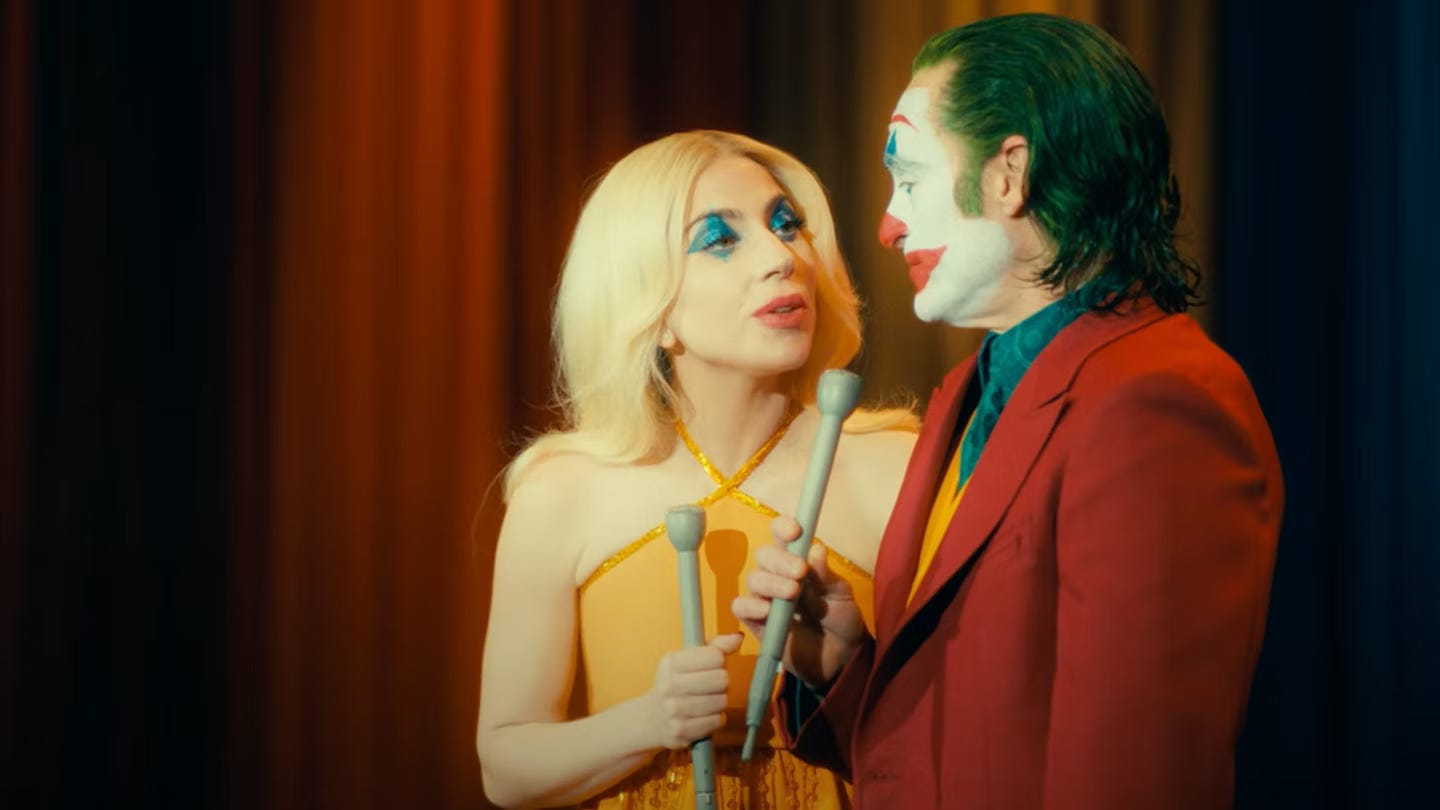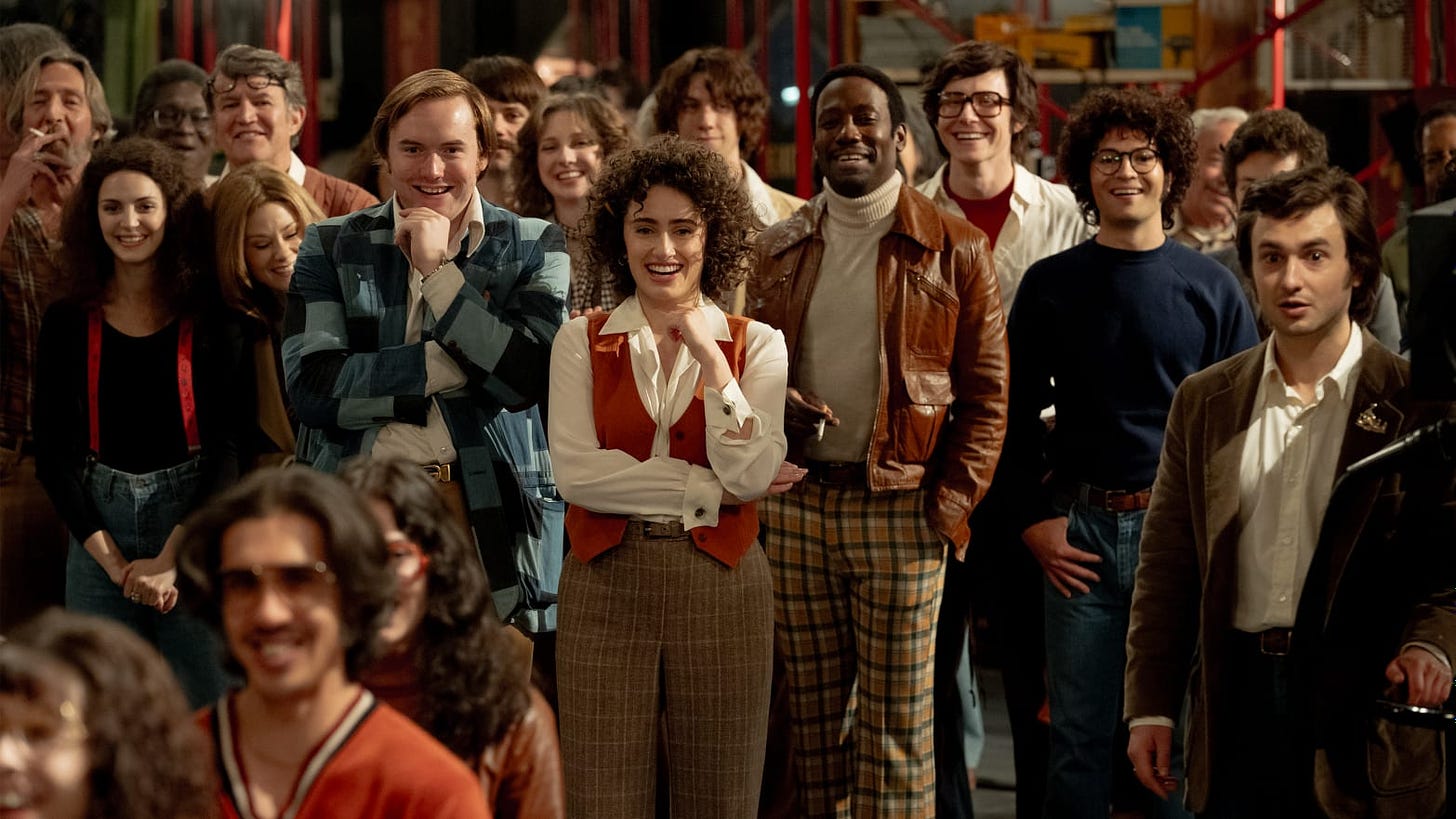In Review: 'Joker: Folie à Deux,' 'Saturday Night'
Todd Phillips and Joaquin Phoenix revive the Clown Prince of Crime in a musical whatsit of a sequel while Jason Reitman revisits the earliest days of 'Saturday Night Live.'
Joker: Folie à Deux
Dir. Todd Phillips
138 min.
What is Joker: Folie à Deux? On the most basic level, it’s Todd Phillips’ sequel to the 2019 film Joker, in which Joaquin Phoenix played a version of the famous Batman villain living in a Gotham City heavily inspired by Martin Scorsese’s depictions of New York in the 1970s and early ’80s. Beyond those basics, it’s a hard film to pin down, but not in a way that makes it more compelling. Co-written, like the original, by Phillips and Scott Silver, the film’s defining quality is dullness. The upside: that leaves plenty of time to contemplate what sort of movie you’re watching. Here are a few possibilities:
Joker: Folie à Deux is an extended recap of the events of Joker
Remember what happened in Joker? Don’t worry, Joker: Folie à Deux spends much of its running time revisiting and analyzing Arthur Fleck’s (Joaquin Phoenix) descent into murderous, clownish madness. It’s so focused on this task, in fact, that it comes at it from multiple angles. Arthur talks it over with his lawyer Maryanne (Catherine Keener). He fields questions and absorbs taunts from fellow inmates and guards at the Arkham State Hospital (a grimy, antiquated facility situated on an island a comfortable distance from the mainland). He gives an interview to hard-nosed TV journalist Paddy Meyers (Steve Coogan, delivering his lines in an American accent that makes Benedict Cumberbatch’s talk-flat-and-enunciate-every-syllable-with-the-precision-of-a-linguistic-marksman approach seem subtle). And, in the film’s most extended sequence, Arthur stands trial for his crimes, opening the door for more summaries of the previous film, sometimes via testimony via one-scene appearances by the characters played by Zazie Beetz and Leigh Gill (who gives the film its most genuinely affecting moment). At times, retelling the first film seems to be Folie à Deux’s raison d'être.
Joker: Folie à Deux is a courtroom drama
Well, sort of. Much of the film’s final act takes place in a courtroom. But courtroom dramas usually revolve around a mystery being uncovered. There’s little mystery to explore here. (See previous entry.)
Joker: Folie à Deux is a love story
As the title suggests, the film revolves around two characters, the other being “Lee” Quinzel (Lady Gaga), a resident of Arkham’s lower-security wing who meets Arthur in a music class and falls for him. To reveal where that goes risks veering into spoiler territory, but what ought to be the film’s most compelling element never really works because Quinzel—through no fault of Gaga—remains so loosely defined. Joker: Folie à Deux knows who she’s not—the tragically infatuated Harley Quinn of the character’s earliest incarnation in Batman: The Animated Series—but it never fully figures out who she is.
Joker: Folie à Deux is a musical
It is, more or less. Phillips pays homage to a wide swathe of classic songs via standards by Cole Porter, Jacques Brel, and Harold Arlen but also songs made famous by Stevie Wonder, the Bee Gees, and others. Sometimes these take the form of fully realized musical fantasy sequences that help bring the film to life and make sense as the delusions of a man with little connection to reality. But more often they’re rough-hewn, performances that take place within the world of the film that play like the musical equivalent of fashionably distressed denim. (The Joker singing “When You’re Smiling (the Whole World Smiles with You)”? Ironic!) That Gaga, of course, can sing, helps, but the film seems to find Phoenix’s frayed warble so fascinating that it needs multiple showcases.
Joker: Folie à Deux is an acting showcase for Phoenix and a musical showcase for Gaga
Sure, but what isn’t?
Joker: Folie à Deux is a big middle finger to those who thought the Joker was cool in the first movie
This ends up being the most compelling element of the movie. Phoenix’s second outing as Fleck emphasizes the character’s patheticness. He begins the film in a depressive funk. When he does go full Joker, he remains unfunny. (Though the permissiveness of the most “I’ll allow it”-prone judge in Gotham City that allows him to wear his make-up and Joker suit in court does provoke one of the film’s few laughs.) A late scene involving Arthur meeting, and being repelled by, some of the city’s biggest Joker fans drives the point home, as does a return to the steps made famous in the first movie for a moment that recontextualizes them. As a rebuke of the tWIsTeD edgelords who embraced the first film, it’s one of the most elaborate kiss-offs imaginable, and it’s hard not to respect that. But why punish everyone else?
Joker: Folie à Deux is a kind of dull and shapeless movie that’s ultimately more memorable as a tuneful mishmash with some intriguing pieces but no clear sense of how to fit them together.
Above all, that feels like the correct answer. —Keith Phipps
Joker: Folie à Deux arrives in theaters tonight.
Saturday Night
Dir. Jason Reitman
108 min.
There’s a point late in Saturday Night where Lorne Michaels, the young and in-over-his-head producer of a new live comedy show on NBC, finally defines, in stirring if exceedingly corny terms, what his vision actually is. Until then, it’s nonstop chaos leading up to the first broadcast on October 11th, 1975, with seemingly the only organizing force being the strong gravitational pull of 11:30 p.m., when the show must go on. (Or be replaced by a Johnny Carson rerun, but let’s not get ahead of ourselves.) Aside from some vague language about bringing a youthful, counterculture edge to a hidebound medium or being the first show by performers who grew up watching TV, it’s still hard to tell, even in 2024, what Michaels has in mind. He’s the eye of a comedy hurricane, a man with little personality surrounded by the whirling egos and fitful brilliance of talents with huge personalities. It’s difficult to make a compelling movie around him.
That’s no fault in the casting, given that Michaels is played by Gabriel LaBelle, who was Steven Spielberg’s young alter-ego in The Fabelmans and who makes Michaels look like the naive, eager, ambitious go-getter Spielberg must have been when he was starting out in television. Though Saturday Night isn’t technically a real-time conceit, it does unfold in the hour-and-a-half before showtime, when this expensive and radical idea for a variety show cycles through a never-ending series of disasters. Some stars are temperamental, like John Belushi (Matt Wood), who won’t sign his contract and bristles at some of the sketch ideas, or host George Carlin (Matthew Rhys), whose irreverence starts at his dressing room. Others, like a noxious Chevy Chase (Cory Michael Smith) or the gregarious Dan Ackroyd (Dylan O’Brien) scramble for the spotlight while Garrett Morris (Lamorne Morris), the lone Black cast member, wonders why he’s even there.
The calamities pop up like Whac-a-Mole for Michaels: The dress rehearsal was three hours and no segments have been cut; the lighting package collapses and starts a small fire; the high-strung woman in charge of standards keeps running through scripts with red ink; Carson and a skeptical NBC exec (Willem Dafoe) hang over production like the sword of Damocles; and there’s a llama held up at the loading dock. All of this madness sounds like the making of a lively screwball comedy, but in reality, it’s Robert Altman by way of Aaron Sorkin, busy for busyness’ sake, paced like something jokey and witty while offering neither jokes nor wit. The camera just fluidly bops from one set of characters and crises to another, often attached to Michaels for a 90-minute walk-and-talk with nervous affiliates, warring crew members, and various cats that need herding.
Director Jason Reitman and his co-writer, Gil Kenan, have lately been reviving Reitman’s dad’s Ghostbusters franchise with Ghostbusters: Afterlife and Ghostbusters: Frozen Empire, with Reitman directing the first and Kenan the second. The hollow soul of Saturday Night is not that far removed from their Ghostbusters reboots in that they seem more interested in preserving valuable IP for posterity than expressing an authentic feeling about them. They have affection for the Ghostbusters and for Saturday Night Live, but it’s not enough for these films to be mere tributes to past triumphs. They need to have a point of view, too. In that deficit, they identify with the screen Lorne Michaels all too well. — Scott Tobias
Saturday Night is currently in limited release. It opens nationwide on Oct. 11.









OLD MAN YELLS AT CLOUD time: the original "Joker" might be my least-favourite bit of pop culture ever. "Wouldn't Taxi Driver have been so much cooler if it had Batman stuff in it? And then instead of psychological complexity, the Batman villain just does a dance?" Like, I'm sure there's been some art made at some point that I've hated more, but I can't think what it might be.
Yet I've been intrigued by the ads for the sequel. I love Gaga an amount, and anything she's in is going to be better than the original, by default. (Also, anything is going to be original, by default.) Or at least more interesting.
But apparently...not?
It honestly pretty remarkable achievement that movies about Joker and Saturday Night Live sound like two least-funny movies of 2024.